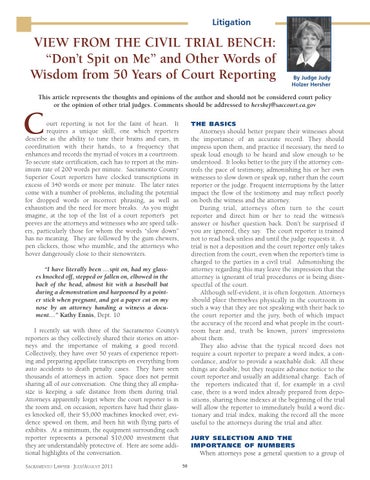Litigation
VIEW FROM THE CIVIL TRIAL BENCH: “Don’t Spit on Me” and Other Words of Wisdom from 50 Years of Court Reporting
By Judge Judy Holzer Hersher
This article represents the thoughts and opinions of the author and should not be considered court policy or the opinion of other trial judges. Comments should be addressed to hershej@saccourt.ca.gov
C
THE BASICS
ourt reporting is not for the faint of heart. It requires a unique skill, one which reporters describe as the ability to tune their brains and ears, in coordination with their hands, to a frequency that enhances and records the myriad of voices in a courtroom. To secure state certification, each has to report at the minimum rate of 200 words per minute. Sacramento County Superior Court reporters have clocked transcriptions in excess of 340 words or more per minute. The later rates come with a number of problems, including the potential for dropped words or incorrect phrasing, as well as exhaustion and the need for more breaks. As you might imagine, at the top of the list of a court reporter’s pet peeves are the attorneys and witnesses who are speed talkers, particularly those for whom the words “slow down” has no meaning. They are followed by the gum chewers, pen clickers, those who mumble, and the attorneys who hover dangerously close to their stenowriters.
Attorneys should better prepare their witnesses about the importance of an accurate record. They should impress upon them, and practice if necessary, the need to speak loud enough to be heard and slow enough to be understood. It looks better to the jury if the attorney controls the pace of testimony, admonishing his or her own witnesses to slow down or speak up, rather than the court reporter or the judge. Frequent interruptions by the latter impact the flow of the testimony and may reflect poorly on both the witness and the attorney. During trial, attorneys often turn to the court reporter and direct him or her to read the witness’s answer or his/her question back. Don’t be surprised if you are ignored, they say. The court reporter is trained not to read back unless and until the judge requests it. A trial is not a deposition and the court reporter only takes direction from the court, even when the reporter’s time is charged to the parties in a civil trial. Admonishing the attorney regarding this may leave the impression that the attorney is ignorant of trial procedures or is being disrespectful of the court. Although self-evident, it is often forgotten. Attorneys should place themselves physically in the courtroom in such a way that they are not speaking with their back to the court reporter and the jury, both of which impact the accuracy of the record and what people in the courtroom hear and, truth be known, jurors’ impressions about them. They also advise that the typical record does not require a court reporter to prepare a word index, a concordance, and/or to provide a searchable disk. All these things are doable, but they require advance notice to the court reporter and usually an additional charge. Each of the reporters indicated that if, for example in a civil case, there is a word index already prepared from depositions, sharing those indexes at the beginning of the trial will allow the reporter to immediately build a word dictionary and trial index, making the record all the more useful to the attorneys during the trial and after.
“I have literally been …spit on, had my glasses knocked off, stepped or fallen on, elbowed in the back of the head, almost hit with a baseball bat during a demonstration and harpooned by a pointer stick when pregnant, and got a paper cut on my nose by an attorney handing a witness a document…” Kathy Ennis, Dept. 10 I recently sat with three of the Sacramento County’s reporters as they collectively shared their stories on attorneys and the importance of making a good record. Collectively, they have over 50 years of experience reporting and preparing appellate transcripts on everything from auto accidents to death penalty cases. They have seen thousands of attorneys in action. Space does not permit sharing all of our conversation. One thing they all emphasize is keeping a safe distance from them during trial. Attorneys apparently forget where the court reporter is in the room and, on occasion, reporters have had their glasses knocked off, their $5,000 machines knocked over, evidence spewed on them, and been hit with flying parts of exhibits. At a minimum, the equipment surrounding each reporter represents a personal $10,000 investment that they are understandably protective of. Here are some additional highlights of the conversation.
8
SACRAMENTO LAWYER JULY/AUGUST 2011
JURY SELECTION AND THE IMPORTANCE OF NUMBERS
When attorneys pose a general question to a group of 50
